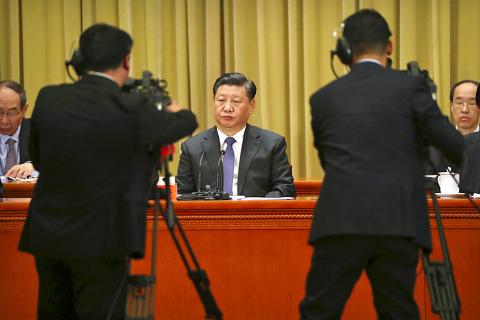China’s armed forces must boost their sense of urgency and do everything they can to prepare for battle, Chinese President Xi Jinping (習近平) told a meeting of top brass on Friday.
China is keen to bolster its armed forces amid territorial disputes in the South China Sea and escalating tensions with the US over issues ranging from trade to the status of Taiwan.
Xinhua news agency said Xi told a meeting of the top military authority that China faced increasing risks and challenges, and the armed forces must work to secure its security and development needs.

Photo: AP
Xi, who is also chairman of the Chinese Central Military Commission, said the armed forces must devise strategies for the new era and take on responsibilities for preparing for and waging war.
“The world is facing a period of major changes never seen in a century and China is still in an important period of strategic opportunity for development,” he was quoted as saying.
The armed forces needed to be able to respond quickly to emergencies, needed to upgrade their joint operations capabilities and nurture new types of forces, Xi said.
Xi’s comments followed his remarks on Wednesday that China still reserved the right to use force to achieve unification with Taiwan and prevent the nation’s independence.
Xi’s Taiwan speech came just days after US President Donald Trump signed the Asia Reassurance Initiative Act into law, reaffirming the US’ commitment to Taiwan’s security.

US President Donald Trump yesterday announced sweeping "reciprocal tariffs" on US trading partners, including a 32 percent tax on goods from Taiwan that is set to take effect on Wednesday. At a Rose Garden event, Trump declared a 10 percent baseline tax on imports from all countries, with the White House saying it would take effect on Saturday. Countries with larger trade surpluses with the US would face higher duties beginning on Wednesday, including Taiwan (32 percent), China (34 percent), Japan (24 percent), South Korea (25 percent), Vietnam (46 percent) and Thailand (36 percent). Canada and Mexico, the two largest US trading

AIR SUPPORT: The Ministry of National Defense thanked the US for the delivery, adding that it was an indicator of the White House’s commitment to the Taiwan Relations Act Deputy Minister of National Defense Po Horng-huei (柏鴻輝) and Representative to the US Alexander Yui on Friday attended a delivery ceremony for the first of Taiwan’s long-awaited 66 F-16C/D Block 70 jets at a Lockheed Martin Corp factory in Greenville, South Carolina. “We are so proud to be the global home of the F-16 and to support Taiwan’s air defense capabilities,” US Representative William Timmons wrote on X, alongside a photograph of Taiwanese and US officials at the event. The F-16C/D Block 70 jets Taiwan ordered have the same capabilities as aircraft that had been upgraded to F-16Vs. The batch of Lockheed Martin

GRIDLOCK: The National Fire Agency’s Special Search and Rescue team is on standby to travel to the countries to help out with the rescue effort A powerful earthquake rocked Myanmar and neighboring Thailand yesterday, killing at least three people in Bangkok and burying dozens when a high-rise building under construction collapsed. Footage shared on social media from Myanmar’s second-largest city showed widespread destruction, raising fears that many were trapped under the rubble or killed. The magnitude 7.7 earthquake, with an epicenter near Mandalay in Myanmar, struck at midday and was followed by a strong magnitude 6.4 aftershock. The extent of death, injury and destruction — especially in Myanmar, which is embroiled in a civil war and where information is tightly controlled at the best of times —

China's military today said it began joint army, navy and rocket force exercises around Taiwan to "serve as a stern warning and powerful deterrent against Taiwanese independence," calling President William Lai (賴清德) a "parasite." The exercises come after Lai called Beijing a "foreign hostile force" last month. More than 10 Chinese military ships approached close to Taiwan's 24 nautical mile (44.4km) contiguous zone this morning and Taiwan sent its own warships to respond, two senior Taiwanese officials said. Taiwan has not yet detected any live fire by the Chinese military so far, one of the officials said. The drills took place after US Secretary